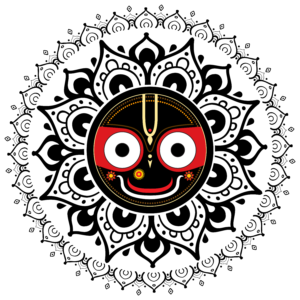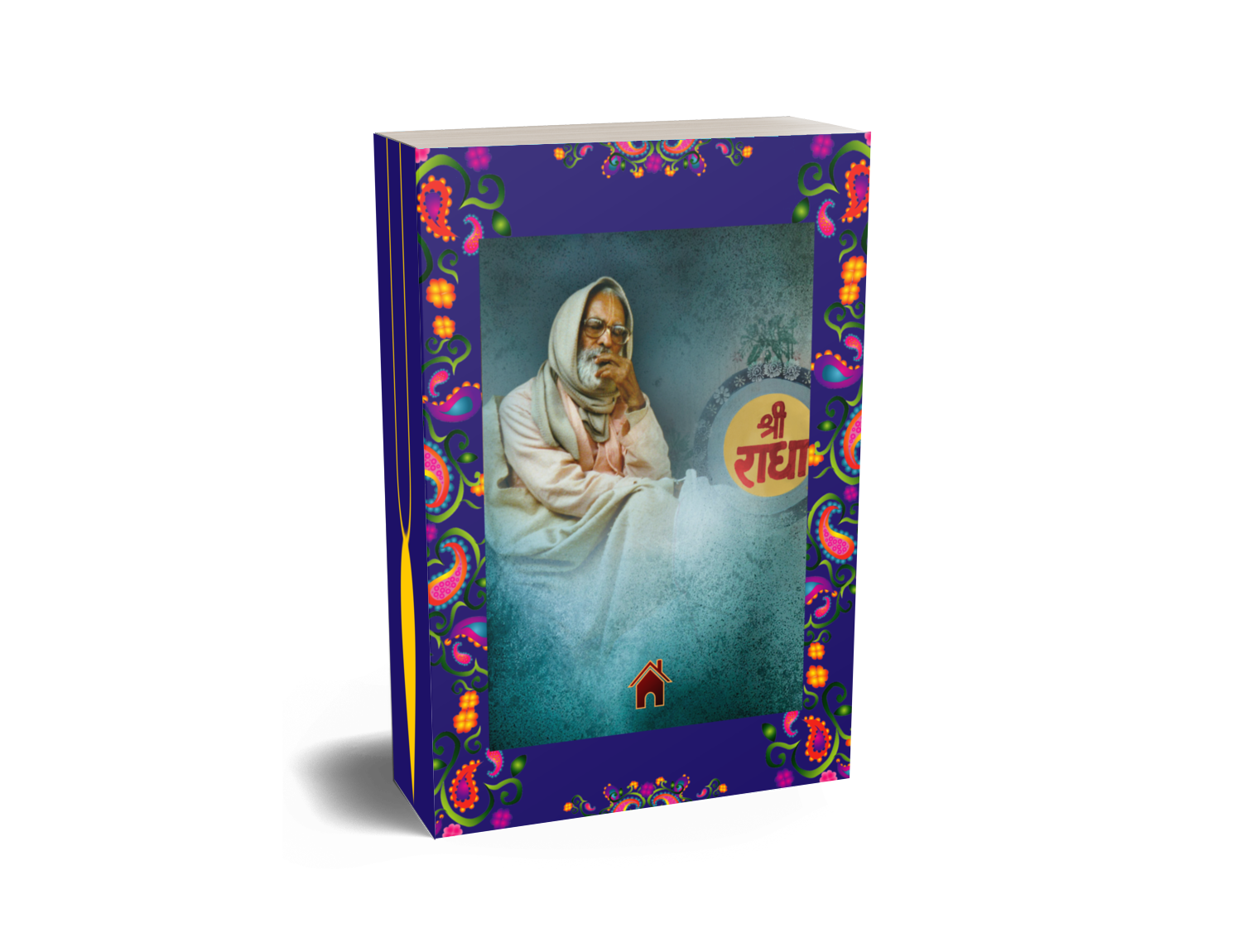

The Story of Prahlāda Mahārāja from Śrīmad–Bhāgavatam, Seventh Canto compiled from lectures by Śrīla Bhaktivedānta Nārāyaṇa Mahārāja (The Fearless Prince, 3rd Edition)
Śrī Kṛṣṇa, the Supreme Lord who attracts every living being with His inconceivable beauty and sweetness, is 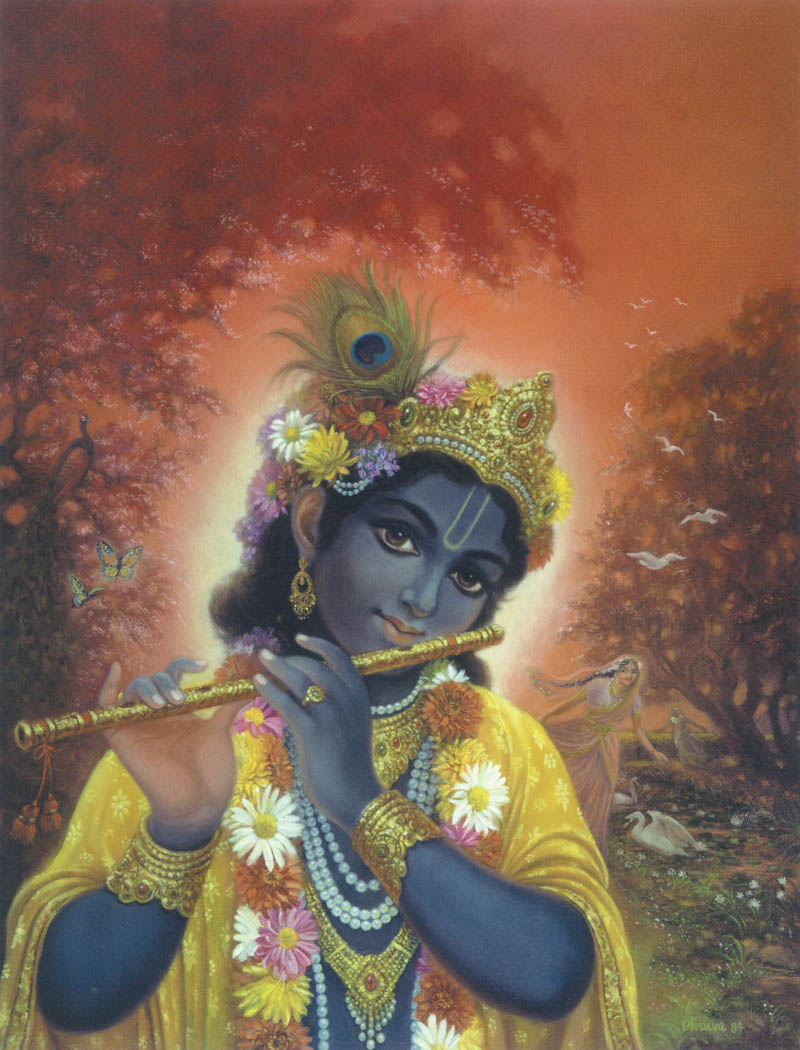 worshipped by different kinds of high-class, self-realized devotees. They are distinguished by the degree of their service, intimacy and awareness of Śrī Kṛṣṇa’s position as the Supreme Godhead. A devotee in the first stage of development is one whose knowledge of Kṛṣṇa’s majesty and opulences is always at the forefront. Such a lover of God knows all transcendental truths – who Kṛṣṇa is, what the nature of the soul is, what illusion (māyā) is, what supreme love is, what the various levels of pure devotion to Śrī Kṛṣṇa are, and what nectar exists in the loving exchanges between Śrī Kṛṣṇa and His devotees.
worshipped by different kinds of high-class, self-realized devotees. They are distinguished by the degree of their service, intimacy and awareness of Śrī Kṛṣṇa’s position as the Supreme Godhead. A devotee in the first stage of development is one whose knowledge of Kṛṣṇa’s majesty and opulences is always at the forefront. Such a lover of God knows all transcendental truths – who Kṛṣṇa is, what the nature of the soul is, what illusion (māyā) is, what supreme love is, what the various levels of pure devotion to Śrī Kṛṣṇa are, and what nectar exists in the loving exchanges between Śrī Kṛṣṇa and His devotees.
The best example of a devotee on this level, who worships the Supreme Lord in a mood of awe and reverence, is Prahlāda Mahārāja. He is honoured with the title ‘Mahārāja’, meaning ‘a king among great personalities endowed with pure love for Śrī Kṛṣṇa’. Today we will explain the bhakti (selfless devotion to Śrī Kṛṣṇa) found in the heart of Prahlāda Mahārāja – how he was an unparalleled devotee of the Supreme Personality of Godhead. If you want to become a devotee of the Lord, you must follow Prahlāda’s example of humility, purity and tolerance. First of all, this will require that you give up your desires for sense gratification and cultivate an exclusive desire for bhakti. Your devotion should not be covered by an over-endeavour to acquire dry knowledge or material happiness or by performing austerities or other extraneous activities, such as mystic yoga, sacrifices, mundane piety and fulfilling vows. Rather, your devotion should exhibit some tendency to serve Śrī Kṛṣṇa with body, mind and words spontaneously. If you engage all the senses and moods of the heart in serving the Lord in this way, then your endeavours will be considered bhakti.
Prahlāda Mahārāja was extraordinary – very humble and very tolerant. His father, Hiraṇyakaśipu, was an erudite scholar of the Vedic scriptures. All the Vedas were on the tip of his tongue, and he was also well-versed in Sanskrit grammar. But his nature was demoniac because he was opposed to Lord Kṛṣṇa. Anyone in this world, whether human or otherwise, surely has a demoniac nature if he is inimical to God. In previous times, there were only two or three demons on the planet, like Rāvaṇa and Hiraṇyakaśipu, but nowadays there are demons everywhere, in every country. For no reason they want to destroy the world. So we should be careful of them. How? We can protect ourselves by chanting the sacred names of God under the guidance of a pure devotee of Lord Kṛṣṇa.
Hiraṇyakaśipu had received a boon from Lord Brahmā, the creator of the material universe, from whom he  had cleverly requested, “Please bless me that I will not die in the air, on this earth or on any lower or higher planet. Bless me that I will not be killed by any weapon, by anything living or dead, by any man or animal created by you (Brahmā), or by any bird, snake or other such creature. Please further bless me that I will not die during the day or night, during any month of any year, or either outdoors or indoors.” He thus received a boon that appeared to make him immortal.
had cleverly requested, “Please bless me that I will not die in the air, on this earth or on any lower or higher planet. Bless me that I will not be killed by any weapon, by anything living or dead, by any man or animal created by you (Brahmā), or by any bird, snake or other such creature. Please further bless me that I will not die during the day or night, during any month of any year, or either outdoors or indoors.” He thus received a boon that appeared to make him immortal.
Though Hiraṇyakaśipu and Prahlāda were related as father and son, they maintained substantial differences of opinion. Hiraṇyakaśipu would quarrel with the child, but the young prince always remained humble and tolerant. Hiraṇyakaśipu was a demon, yet Prahlāda Mahārāja was a pure-hearted devotee and was like a demigod. It is quite unusual for the son of a demon to be a high-class devotee with a godly personality. Of Hiraṇyakaśipu’s four sons, Prahlāda was the youngest. His father favoured him because he was very intelligent. He, therefore, sent him to the school of Śukrācārya, the materialistic guru of the demons.
At that time Śukrācārya was absent, having gone away on a long mission, so his sons Ṣaṇḍa and Amarka were teaching the young prince. Ṣaṇḍa means ‘bull’. A bull is very lusty and dangerous, and sometimes it goes mad. Arka means ‘light’, so Amarka means ‘where there is no light’. These two brothers were not in the light, meaning they had no realization of the self. Persons who act like bulls and who are always in darkness, ignorant of the fundamental transcendental truths about the Supreme Godhead, are like Ṣaṇḍa and Amarka. Hiraṇyakaśipu ordered them, “Teach my boy Prahlāda about mundane religious duties, economic development, sense gratification and liberation. Especially focus on politics – how to defeat enemies, how to acquire kingdoms, and how to hide the truth by diplomacy.”
were teaching the young prince. Ṣaṇḍa means ‘bull’. A bull is very lusty and dangerous, and sometimes it goes mad. Arka means ‘light’, so Amarka means ‘where there is no light’. These two brothers were not in the light, meaning they had no realization of the self. Persons who act like bulls and who are always in darkness, ignorant of the fundamental transcendental truths about the Supreme Godhead, are like Ṣaṇḍa and Amarka. Hiraṇyakaśipu ordered them, “Teach my boy Prahlāda about mundane religious duties, economic development, sense gratification and liberation. Especially focus on politics – how to defeat enemies, how to acquire kingdoms, and how to hide the truth by diplomacy.”
After four or five months in the school, Prahlāda returned home. His mother, Kayādhu, decorated him and brought him to his father. When Hiraṇyakaśipu saw his beautiful and humble son, he kissed him and happily took him on his lap. “My dear son,” he said, “you are so intelligent, and I am so pleased with you. What have you been studying? Tell me the best thing you have learned in school.”
Prahlāda Mahārāja replied:
śrī-prahrāda uvāca
śravaṇaṁ kīrtanaṁ viṣṇoḥ
smaraṇaṁ pāda-sevanam
arcanaṁ vandanaṁ dāsyaṁ
sakhyam ātma-nivedanam
iti puṁsārpitā viṣṇau
bhaktiś cen nava-lakṣaṇā
kriyeta bhagavaty addhā
tan manye ’dhītam uttamam
(Śrīmad-Bhāgavatam 7.5.23-24)
[Prahlāda Mahārāja said: Hearing and chanting about the transcendental holy name, form, qualities, paraphernalia and pastimes of Lord Viṣṇu, remembering them, serving the lotus feet of the Lord, offering the Lord respectful worship with sixteen types of paraphernalia, offering prayers to the Lord, becoming His servant, considering the Lord one’s best friend, and surrendering everything unto Him (in other words, serving Him with the body, mind and words) — these nine processes are accepted as pure devotional service. One who has dedicated his life to the service of Kṛṣṇa through these nine methods should be understood to be the most learned person, for he has acquired complete knowledge.]
“Nine processes are accepted as pure devotional service: hearing and chanting about the transcendental holy name, form, qualities, paraphernalia and pastimes of Lord Kṛṣṇa (Viṣṇu), remembering Him, serving His lotus feet, offering Him respectful worship with many nice items, offering Him prayers, becoming His servant, considering Him one’s best friend, and surrendering everything unto Him (in other words, serving Him with body, mind and words). One who has dedicated his life to the service of Śrī Kṛṣṇa through these nine methods should be understood to be the most learned person, as he has acquired complete knowledge.”
Hearing his son’s expression of devotion to the Supreme Lord, Hiraṇyakaśipu became red hot with anger. Then, 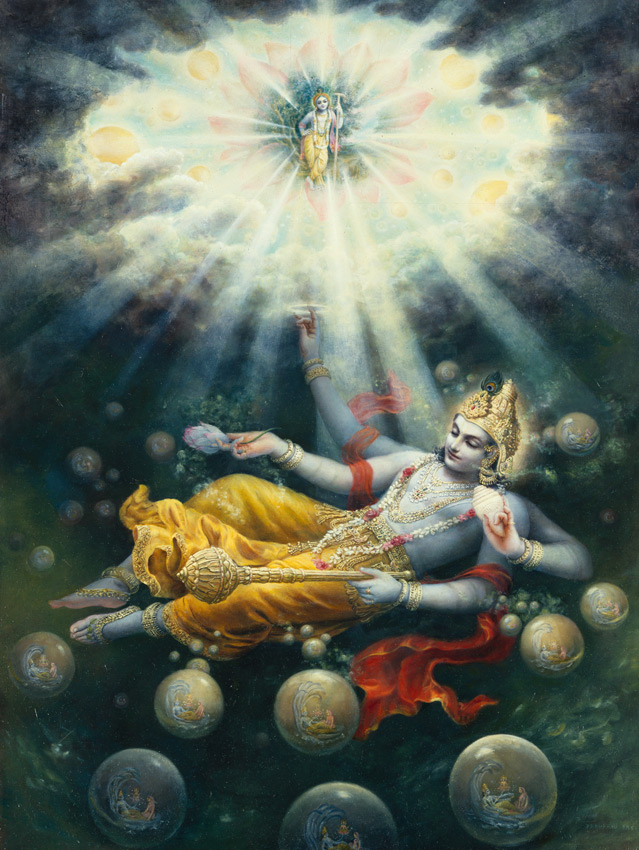 laughing at the irony of the situation he shouted, “Prahlāda, I brought you into this world. I am the person who maintains you and takes care of you. Everything you have comes from me. How can you be so ungrateful as not to respect me as your father and instead take the side of our enemy Viṣṇu?! Prahlāda, who has taught you about Viṣṇu? Your gurus, Ṣaṇḍa and Amarka?” Turning to the boy’s teachers, he sharply denounced them, “Is this what you have taught my son? I instructed you to teach him practical matters for his material success. Why have you taught him about spirituality and devotion to Viṣṇu? For this, I will punish you! I will cut off your heads!”
laughing at the irony of the situation he shouted, “Prahlāda, I brought you into this world. I am the person who maintains you and takes care of you. Everything you have comes from me. How can you be so ungrateful as not to respect me as your father and instead take the side of our enemy Viṣṇu?! Prahlāda, who has taught you about Viṣṇu? Your gurus, Ṣaṇḍa and Amarka?” Turning to the boy’s teachers, he sharply denounced them, “Is this what you have taught my son? I instructed you to teach him practical matters for his material success. Why have you taught him about spirituality and devotion to Viṣṇu? For this, I will punish you! I will cut off your heads!”
Ṣaṇḍa and Amarka began to tremble. “O sir,” they replied, “we have not trained him in devotion to Viṣṇu. We do not know where he has picked up this foolishness. He just speaks these things instinctively. Ask him where he learned this. Ask him if we taught it to him or if he heard this from someone else.”
Hiraṇyakaśipu angrily questioned his boy, “Where did you learn this? If these two gurus, Ṣaṇḍa and Amarka, have not taught you this, then where did you learn all this nonsense that you are speaking so boldly? Who visited the school? Nārada or any other devotee? Speak the truth; otherwise, I will kill you. Do you think I am foolish? Or your gurus, Ṣaṇḍa, Amarka and Śukrācārya – do you think they are foolish? Do you think that they don’t know anything? Is this what you are implying?” He then ordered the two teachers, “Take Prahlāda and again teach him politics and diplomacy – how to control subjects, how to conquer others, and how to be powerful like me. Furthermore, a guard should be kept to ensure that no devotee of that Kṛṣṇa, Viṣṇu, enters that part of the school.”
Thereupon, Ṣaṇḍa and Amarka took the boy back to school. Some months later Prahlāda again returned home. Mother Kayādhu decorated her son and brought him to the lap of his father. Hiraṇyakaśipu, very happy to see his son, asked the same question as before, “What have you learned in school from your guru?”
Prahlāda answered, “O my dear father, those persons whose consciousness is not fixed on Śrī Kṛṣṇa but rather on enjoying material life cannot actually understand the goal of life and their real self-interest. This human form of life is meant for worshipping the Supreme Lord Kṛṣṇa, but materialistic persons can never understand this because their senses are uncontrolled. Totally dedicated to satisfying their senses, they are pulled away from pursuing the real goal of life and repeatedly engage in chewing the chewed. The materialistic way of life is like chewing repeatedly, which has already been chewed, looking for happiness where there is none to be found. Although there is no profit in such a life, people with uncontrolled senses are enamoured by it. Thus, they enter into the darkest regions of ignorance and progress towards a hellish situation filled with untold suffering.
“Persons who are striving to enjoy material life or who are totally immersed in family affairs remain unaware that the ultimate goal of our existence is to worship the lotus feet of Lord Viṣṇu and go back home, back to Godhead. Instead, they focus all their aspirations on the false hope of trying to enjoy their  body, wife, children, home, relatives, job and society, convinced that these things will make them happy. But the truth of the matter is that family and material success actually have nothing to do with their real self-interest. Completely blind to the actual purpose of human life, such persons accept as their guru another blind man who is also attached to materialistic life. Thus, the blind lead the blind. Inevitably all of them stray from the path and fall into a ditch. If the guru does not know the purpose of life, then he is destined for hell, along with his disciples.”
body, wife, children, home, relatives, job and society, convinced that these things will make them happy. But the truth of the matter is that family and material success actually have nothing to do with their real self-interest. Completely blind to the actual purpose of human life, such persons accept as their guru another blind man who is also attached to materialistic life. Thus, the blind lead the blind. Inevitably all of them stray from the path and fall into a ditch. If the guru does not know the purpose of life, then he is destined for hell, along with his disciples.”
Hiraṇyakaśipu became furious. “Are you insinuating that I am blind and foolish?” he screamed, “and that my guru, Śukrācārya, and his sons Ṣaṇḍa and Amarka are bogus persons? Are you saying that they have no intelligence and that you know more than them? Don’t you know how great my guru is? He is so learned and powerful that just by sprinkling a few drops of water on a dead body he can bring that person back to life. Do you think that my guru and I are so misdirected that you should teach us about spiritual life? I have worshipped Lord Brahmā for over 20,000 years. Do you think I have simply wasted my time? For disrespecting my guru and my beliefs, prepare to meet your death, for I shall put an end to you and your foolish talk of God!”
Prahlāda Mahārāja remained totally fearless. He boldly declared, “Yes, both of you are blind – your guru and you. Both of you are demons and, therefore, blind to the truth. If you do not humbly approach high-class, qualified devotees whose hearts are immersed in their loving service to the Supreme Lord and who kindly instruct others on devotional service, then you have no intelligence. You must bathe and purify your mind in the dust of the lotus feet of such saintly personalities, meaning that you must hear and follow their instructions. If you accept their guidance, your intelligence will become fixed on Śrī Kṛṣṇa, and all the impure desires in your heart will be removed. Dear father, give up your egotistical ways and take shelter of such a bona fide guru, whose only wealth in life is the Supreme wealth – devoted service to Śrī Kṛṣṇa. Only then can you be freed from your 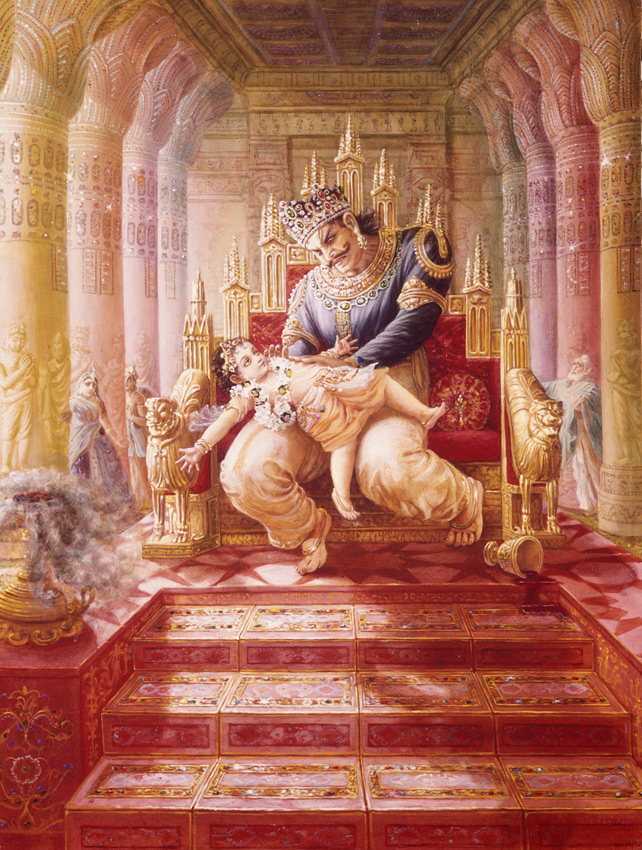 contaminated material consciousness.”
contaminated material consciousness.”
Again his wicked father, Hiraṇyakaśipu, raged in anger, “Oh! I will punish you!” That demon took up his sword and club, intending to kill Prahlāda, but mysteriously he found he was powerless to do so. Then he ordered his generals, “This boy should be put to death at once.” The whole army was deputed to kill the young prince, but they also were rendered impotent in front of the child. Hiraṇyakaśipu repeatedly tried to kill Prahlāda Mahārāja, giving his soldiers one command after another:
“Bring mad elephants and let them attack him.”
“Throw him into a pit of venomous snakes that will bite him to death.”
“Force him to drink strong, vile poison.”
“Put him in a cage with dangerous lions and let them devour him.”
“Bind him to a rock and hurl him from the peak of a mountain into the ocean to drown.”
“Crush him with an onslaught of massive boulders.”
But each and every scheme was foiled by the Lord saving Prahlāda. The soldiers’ swords could not cut him. The mere touch of Prahlāda’s body electrified the elephants, and as they ran off in fear, they crushed so many soldiers and demons. The lions befriended the boy and began to lick him. And as Prahlāda was falling into the ocean, Lord Viṣṇu Himself came and caught him and gently placed him on the shore.
Hiraṇyakaśipu tried one more time. He had a very beautiful and powerful sister named Holikā. She was so accomplished in mystic yoga that she could enter blazing fire without getting burnt. Summoning her at once, the great emperor petitioned her, “My dear sister, my darling sister, I am requesting your help. I have tried so hard to kill Prahlāda, but it seems impossible. Now I am relying on you to accomplish this task. I know that this will be a simple matter for you. Take him in your arms and enter a big fire. Surely, the boy will be destroyed, and you will come out untouched. I will reward you very handsomely with so much wealth.” Prahlāda’s dear auntie was most 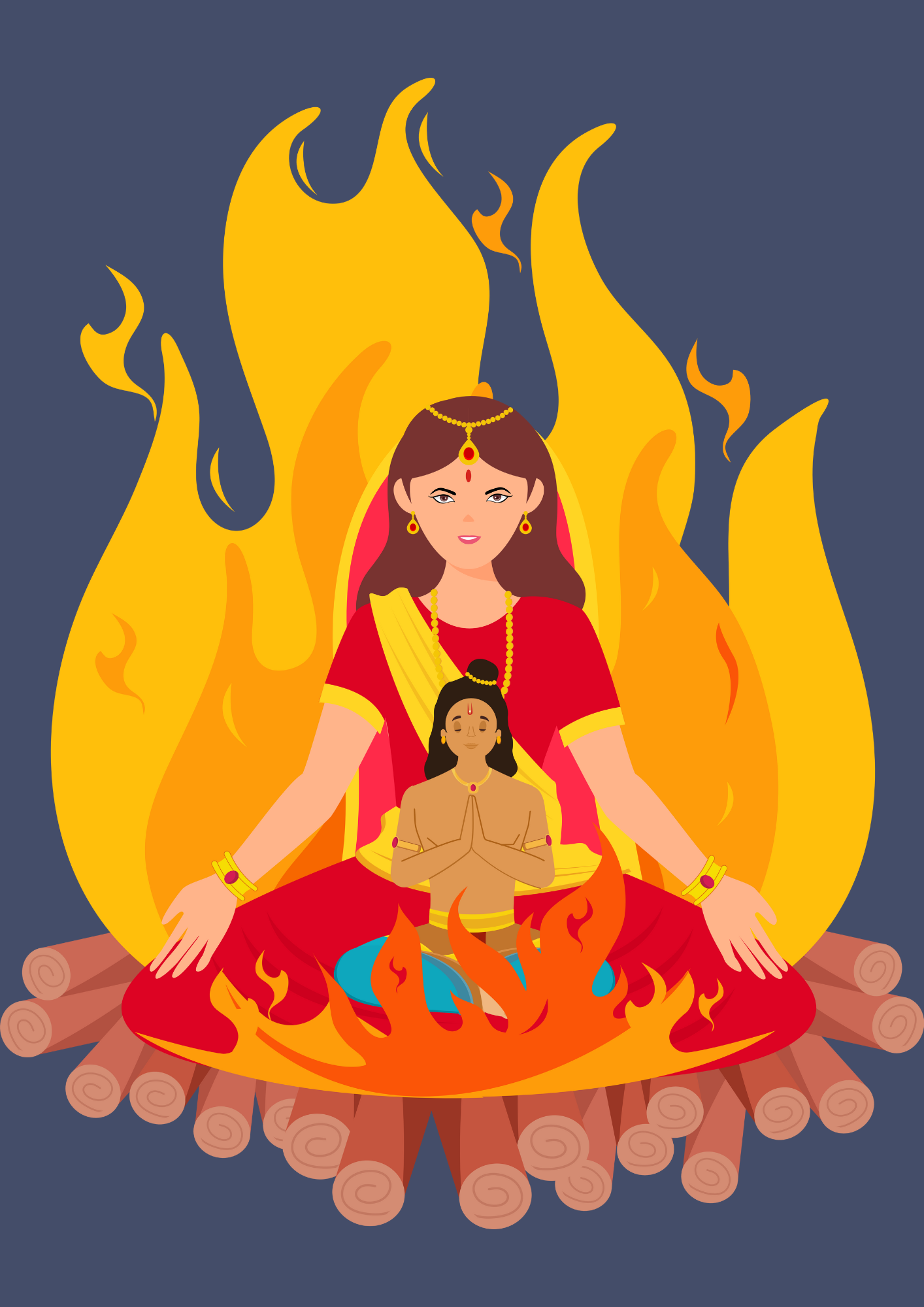 happy to comply, being hungry for riches and having no real affection for her nephew.
happy to comply, being hungry for riches and having no real affection for her nephew.
A huge fire was ignited, its towering flames appearing like giant tongues touching the sky. Holikā decorated herself nicely and, happily taking Prahlāda Mahārāja in her arms, she entered the fire. But something very mystical happened. The fire could not touch Prahlāda Mahārāja and Holikā was at once burnt to ashes. To Prahlāda, the flames felt like cool snow, and he emerged from the fire blissfully chanting, “Hare Kṛṣṇa, Hare Kṛṣṇa, Kṛṣṇa Kṛṣṇa, Hare Hare / Hare Rāma, Hare Rāma, Rāma Rāma, Hare Hare.”
Hiraṇyakaśipu and his whole entourage could do nothing to harm Prahlāda because Śrī Kṛṣṇa never failed to protect the boy. Kṛṣṇa has promised, “I will always protect those who take shelter of Me. If I want to save My surrendered devotees, no one can hurt them, even if the whole world is bent on doing so.” If one takes shelter of the Supreme Personality of Godhead, Śrī Kṛṣṇa, or any bona fide guru like Nārada, Vyāsa, Śukadeva Gosvāmī, Rūpa Gosvāmī and Sanātana Gosvāmī, no one can harm him, even if the whole world is against him. Kṛṣṇa is bound to save him. Therefore, even though Hiraṇyakaśipu was inconceivably powerful and desperate to kill his son, his every attempt proved futile.
Hiraṇyakaśipu became filled with anxiety. He worried, “I did everything I could to destroy Prahlāda, but all my efforts failed. Perhaps this boy has some mystic powers and will end up killing me instead.” Previously, Hiraṇyakaśipu thought that the boon he had received from Lord Brahmā made him immortal, but now he became afraid. He, who had amassed huge power and taken control of the whole universe, now felt puzzled and totally helpless.
Ṣaṇḍa and Amarka reassured him, “Oh, there is nothing to worry about. You are the emperor of the whole universe. Prahlāda is just a small child. Why are you so troubled? He is like a mosquito. You can easily squash him with your fingers and kill him.
“Our father Śukrācārya is the master of all knowledge. Let us wait until he returns, and he will resolve this problem. Until then, we will continue teaching your son. Our father’s power is such that he can revive a dead body just with his glance. And if ever he becomes so angry that his eyes turn red, the mere raising of his eyebrows can burn someone to ashes. By his persuasive logic, he will bring Prahlāda to his senses, and then the boy will do whatever you tell him. In the meantime let him come with us.”
Thus Prahlāda Mahārāja was forced to return to the school with his gurus. They continued their attempts to divert his propensity for spiritual life. They tried to instil in him his father’s voracious lust for dominion over material affairs, teaching him how to cheat others, how to become vastly wealthy, how to make merry and how to be expert in gratifying his senses. But Prahlāda was boldly fixed in his faith and was never affected by them. Instead, he was silent, and within his mind, he remained absorbed in chanting Śrī Kṛṣṇa’s names and remembering His pastimes and qualities.
One day the teachers had to go out for some other business. They appointed Prahlāda Mahārāja as class monitor. “We will return very soon,” they said. “Look after the other children. Make sure that they do not quarrel and that they do not spend all their time playing. They should be calm and quiet under your supervision. We will return shortly.”
As soon as their gurus left, the children, who were also the sons of demons, started to play. Prahlāda Mahārāja humbly requested them, “O my friends, O sons of demons, listen to me. I want to tell you something that will make you happy for your whole life. After that, you can go and play.” Because they had great honour for Prahlāda, they assembled before him, even though he was only five years old. He then began to instruct his classmates.
“O my brothers, listen! From this early age, we should meditate on the Supreme Lord. Nothing in this world exists on its own. Some say that everything has come from nature, but what does ‘nature’ mean? Whose nature is it? Nature is the power, the energy, of Śrī Kṛṣṇa. He can create and control millions of universes, and in a moment, He can destroy them. And then, in the next moment, He can create them again. He is supremely powerful. Furthermore, He knows each and every one of you, but you do not know Him. Through my constant chanting and remembering the Lord, I have been able to learn a little about Him.
“We should begin spiritual life from a young age – from this very moment, right now! Don’t say, ‘I will begin 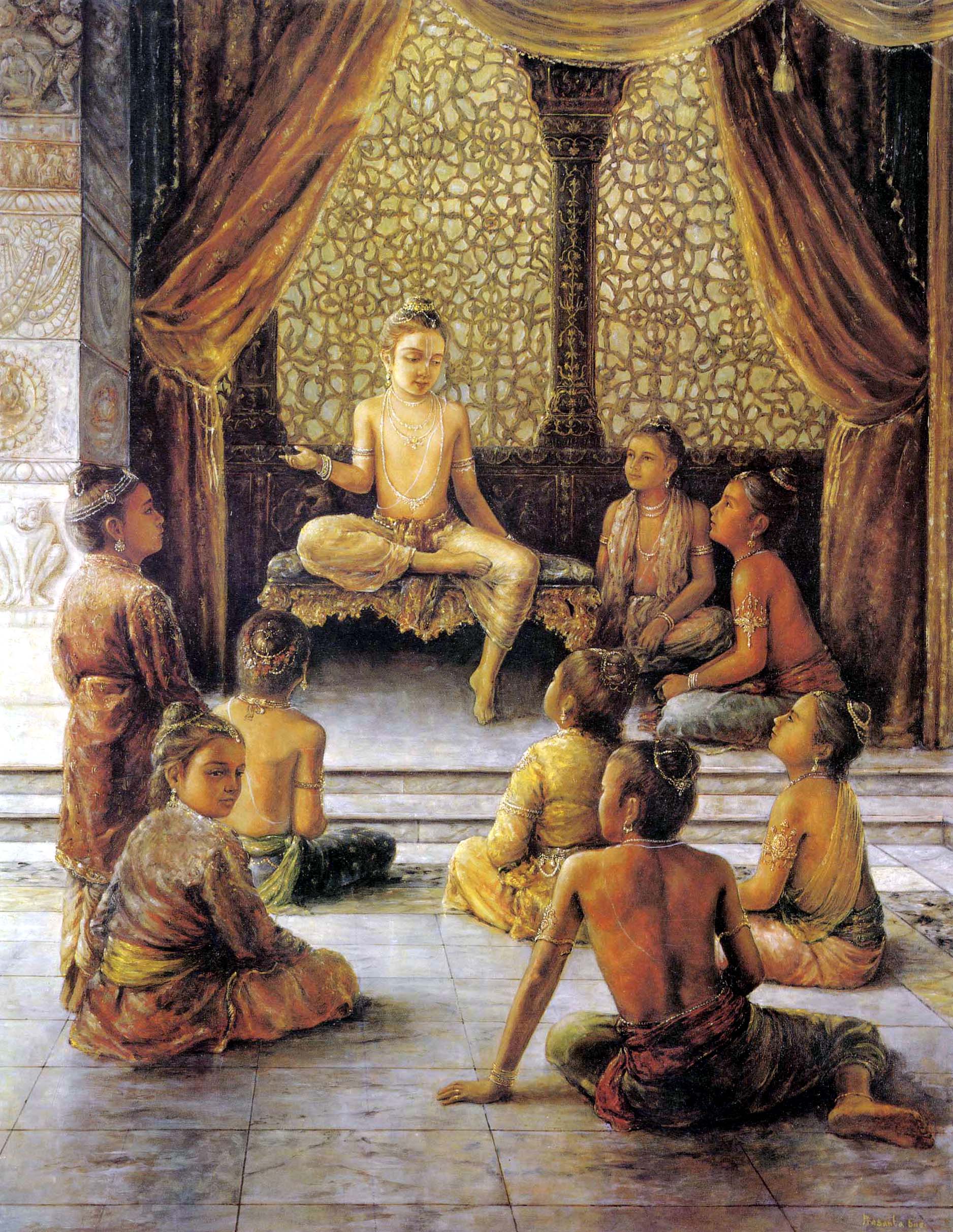 tomorrow.’ It may well be that tomorrow will never come for you. Don’t waste your time uselessly trying to enjoy temporary material life. Start from today. What you intend to do tomorrow you should begin today, and what you are going to do today, you should begin right now. Chant ‘Hare Kṛṣṇa, Hare Kṛṣṇa, Kṛṣṇa Kṛṣṇa, Hare Hare / Hare Rāma, Hare Rāma, Rāma Rāma, Hare Hare.’ Old age and disease are bound to come. And whatever you collect in this life – be it wealth, reputation or position – you will have to leave behind. You cannot take even one penny with you from this world. Do you agree?”
tomorrow.’ It may well be that tomorrow will never come for you. Don’t waste your time uselessly trying to enjoy temporary material life. Start from today. What you intend to do tomorrow you should begin today, and what you are going to do today, you should begin right now. Chant ‘Hare Kṛṣṇa, Hare Kṛṣṇa, Kṛṣṇa Kṛṣṇa, Hare Hare / Hare Rāma, Hare Rāma, Rāma Rāma, Hare Hare.’ Old age and disease are bound to come. And whatever you collect in this life – be it wealth, reputation or position – you will have to leave behind. You cannot take even one penny with you from this world. Do you agree?”
“Yes, we agree completely,” the boys replied. “You are certainly speaking the truth.”
“My dear friends, O sons of demons, the human form of life is temporary, whereas the soul within is eternal. This human life is meant to discover one’s real identity – the soul – and to return home, back to Godhead. Therefore every living entity, especially in the human form of life, should engage in devotional service to the Supreme Lord Kṛṣṇa. This devotional service is natural because Lord Kṛṣṇa is the creator and master of the soul. He is the well-wisher of all living entities and the soul’s most beloved. Everyone’s duty is to take shelter of the Supreme Lord and wholeheartedly engage in His service. By this, the living being becomes free from all material desires and starts to taste the transcendental bliss that comes from serving the Lord with love. Thus, when one is completely liberated from material existence, one experiences real happiness in life.
“Therefore, my brothers immediately begin meditating upon and worshipping Lord Kṛṣṇa, who is supremely attractive. From this very moment begin chanting ‘Hare Kṛṣṇa, Hare Kṛṣṇa, Kṛṣṇa Kṛṣṇa, Hare Hare / Hare Rāma, Hare Rāma, Rāma Rāma, Hare Hare.’ We will all grow old and have to die. Start from the beginning of your life. Don’t waste your time on politics, duplicity, hypocrisy and so on. Remember that Śrī Kṛṣṇa is the Supreme Lord. He is all-powerful and He is so merciful, causelessly merciful. He has invested all His power, all His beauty, all His sweetness and all His causeless mercy in His names. So if you chant and remember these names, you will get so much benefit.”
The leader of the boys, however, challenged, “Why should we chant and meditate on the name of Kṛṣṇa? We are young; why should we not play? And later we can become experts in making money and in arranging for our material comforts. This will make us happy.”
Prahlāda Mahārāja retorted, “These activities will not bring you happiness. Who knows if you will even reach old age? And if you do, then disease will come, and finally, you will die – tomorrow, the day after tomorrow, or even just now. Any minute you could be struck by a thunderbolt and die on the spot.”
If you are going somewhere by aeroplane, the machine can suddenly fail and all four hundred persons aboard can die. No one will know where your body and bones end up.
Prahlāda continued, “Even if you do not meet an untimely death and you reach old age, then after eighty, you will  not even be able to sit straight to meditate and chant. So many diseases will come. Your daughter-in-law will create so many problems – she will beat your back with a broom – oh, she will make you very clean! You will be beset by so many difficulties that you will not be able to chant and remember. It may be that your throat will choke up and you will be unable to speak. You may become mad or senile. So many problems can come and distract you from remembering the Lord.
not even be able to sit straight to meditate and chant. So many diseases will come. Your daughter-in-law will create so many problems – she will beat your back with a broom – oh, she will make you very clean! You will be beset by so many difficulties that you will not be able to chant and remember. It may be that your throat will choke up and you will be unable to speak. You may become mad or senile. So many problems can come and distract you from remembering the Lord.
“Understand that this life is meant only to revive your lost relationship with the Supreme Lord Kṛṣṇa. You now have the chance to come out of the endless chain of birth and death and to reinstate yourself in the blissful service of the Lord for your eternal, perfect existence. Real happiness lies in spiritual life. Material attachments, especially the illusory happiness of family life, hold one back from taking up devotional practices. If you marry in your old age, then how will you be able to renounce your newly wedded wife and small, weeping children? If your father is too old, how will you give him up? Your children, very small and very sweetly calling out, ‘Papa, Mama’ – how can you give them up? Your beautiful gardens, beautiful dogs – how can you give them up?
“Once a person’s consciousness is awakened to the knowledge that he is an eternal living being who finds his true happiness only in serving the Supreme Lord, these other relationships become insignificant. Better to give up your plans for material enjoyment at this young age and chant and remember Śrī Kṛṣṇa. This human life is rarely achieved, and although temporary, it affords the opportunity to perform devotional service. Even a slight amount of sincere devotional activity can bring complete perfection. If you want to be happy, what should you do? Practice bhakti-yoga. Begin to serve Lord Śrī Kṛṣṇa.”
From boyhood, from the beginning of your life, devote yourselves to Śrī Kṛṣṇa. At whatever point in your life you hear this message, even if you are fifty years old, no harm – you can still start to practice. You are able to hear this message due to previous good association. This means that as a result of spiritual merits accrued in a previous life, you had the good fortune to meet a saint at that time, and as a result, you now are receiving this knowledge.
We should not waste our time in sense gratification and other useless activities. Why? In whatever species you  take birth, sense gratification is available. In animal life – if you are in the body of a dog or pig, you can collect unlimited wives. You do not have to spend any money on them, and there is no need to worry about divorce. Oh, freely you can enjoy so many new, new wives. You will not have to worry about being taken to court – nothing is required for the maintenance of your children. In the human form, you can have only one son or daughter a year – not more than that. Occasionally someone will have twins, but that is rare. But hogs, pigs and dogs can have eight, ten, twelve, or even sixteen babies at a time. So, in this respect, they are superior to us. At any time, in any species of life, you can have all the sense gratification that the animals enjoy. They are more expert in enjoying their senses than you, so do not let yourself become absorbed simply in satisfying your senses. From the beginning of your life chant Śrī Kṛṣṇa’s names, remember Him and meditate on Him.
take birth, sense gratification is available. In animal life – if you are in the body of a dog or pig, you can collect unlimited wives. You do not have to spend any money on them, and there is no need to worry about divorce. Oh, freely you can enjoy so many new, new wives. You will not have to worry about being taken to court – nothing is required for the maintenance of your children. In the human form, you can have only one son or daughter a year – not more than that. Occasionally someone will have twins, but that is rare. But hogs, pigs and dogs can have eight, ten, twelve, or even sixteen babies at a time. So, in this respect, they are superior to us. At any time, in any species of life, you can have all the sense gratification that the animals enjoy. They are more expert in enjoying their senses than you, so do not let yourself become absorbed simply in satisfying your senses. From the beginning of your life chant Śrī Kṛṣṇa’s names, remember Him and meditate on Him.
Furthermore, as everyone knows, suffering comes without invitation. All kinds of problems – death, old age, disease, quarrelling with neighbours and so many other difficulties come, and the government also creates so many problems. Hardships come without invitation and without warning. This holds true also for our happiness. By our previous pious activities we are entitled to a certain amount of happiness. It will come automatically. There is no need to work for it.
If we believe in God, all kinds of happiness will automatically come without invitation. Why should we be so anxious for our enjoyment? In this life we need not endeavour for any material happiness, and we need not worry about removing our difficulties. To do so is not the aim and object of our life. Difficulties will come regardless of whether we like it or not. They will force themselves upon us and we will have to taste them. We are bound to taste the reactions from all our past activities, so why are we wasting our time worrying over our happiness and distress? Instead, we should chant the holy name of Kṛṣṇa – it is very powerful. Kṛṣṇa has made His name more merciful and more beautiful than He Himself! All of His sweet pastimes are in His name. We should not think that His name is merely a mundane sound vibration. It is extremely powerful, so from the beginning of our lives we should chant His holy name.
Suppose in Kali Yuga (the present age of hypocrisy and quarrel) one lives for 100 years. In previous ages,  millions of years ago, people lived inconceivably long lives. In Satya-yuga (the age when truth and goodness prevailed everywhere) people lived to be more than 100,000 years old. Some were practically immortal. In Tretā-yuga, people lived about 10,000 years, and in Dvāpara-yuga they lived nearly 1,000 years. Now in Kali-yuga people do not control their senses – taking whiskey, cigarettes, eggs, meat and wine. These things shorten one’s life span. People suffer from tuberculosis, cancer and so many kinds of new diseases that cannot be cured in hospitals or controlled by scientists or anyone else. New, new diseases arise, like AIDS. We do not know where all the diseases are coming from, but there is no doubt that they are the result of excessive indulgence.
millions of years ago, people lived inconceivably long lives. In Satya-yuga (the age when truth and goodness prevailed everywhere) people lived to be more than 100,000 years old. Some were practically immortal. In Tretā-yuga, people lived about 10,000 years, and in Dvāpara-yuga they lived nearly 1,000 years. Now in Kali-yuga people do not control their senses – taking whiskey, cigarettes, eggs, meat and wine. These things shorten one’s life span. People suffer from tuberculosis, cancer and so many kinds of new diseases that cannot be cured in hospitals or controlled by scientists or anyone else. New, new diseases arise, like AIDS. We do not know where all the diseases are coming from, but there is no doubt that they are the result of excessive indulgence.
Prahlāda continued speaking to his schoolmates: “If you live one hundred years, half of your time is lost in sleep. Thus fifty years remain. And if you are not disciplined and regulated in your habits, then your life will be even shorter. Childhood, up to age twenty, goes in vain, playing, studying and then becoming an expert in a skill so that you can maintain yourself. For most people the years from 80 to 100 are useless – you cannot sit, you cannot meditate or do practically anything. Whatever time is left is spent in marriage.”
These days people get married not just once – so many people get divorced and marry again how many times! There is no gain in this. Marriage brings children who need to be provided with education and other necessities. And to keep up with the rest of society, a car is essential, as are all the furnishings for the house – television and so many newer and newer gadgets – especially computers. So when will there be time to remember Śrī Kṛṣṇa and worship Him? There will be no time at all.
Hearing Prahlāda’s message, the other boys asked him, “What should we do?”
“Do not worry about making money or anything else,” Prahlāda replied. “Achieving material happiness and  avoiding suffering is not our business in life. Whatever happiness or distress will come to us is already written in our fate. We have our destinies mapped out from our previous lives. We do not want to suffer, but it comes. We do not want old age, but it will come. We do not want to die, but death will come. We do not want our husbands or wives to divorce us, but it happens anyway. We want to be happy, but automatically suffering comes of its own accord. No one can avoid it. Similarly, happiness in our lives will come without any effort on our part, so we should not be so concerned about it. We should put our energy into chanting and remembering Kṛṣṇa, and by doing so, we will be happy forever. Chanting Hare Kṛṣṇa is the panacea for all miseries. It is so powerful that even our endless cycle of birth and death will be broken. This is the way.”
avoiding suffering is not our business in life. Whatever happiness or distress will come to us is already written in our fate. We have our destinies mapped out from our previous lives. We do not want to suffer, but it comes. We do not want old age, but it will come. We do not want to die, but death will come. We do not want our husbands or wives to divorce us, but it happens anyway. We want to be happy, but automatically suffering comes of its own accord. No one can avoid it. Similarly, happiness in our lives will come without any effort on our part, so we should not be so concerned about it. We should put our energy into chanting and remembering Kṛṣṇa, and by doing so, we will be happy forever. Chanting Hare Kṛṣṇa is the panacea for all miseries. It is so powerful that even our endless cycle of birth and death will be broken. This is the way.”
His schoolmates said to him, “What you have said is very good. Please tell us how we can serve the Supreme Personality of Godhead. What is the process?”
Prahlāda answered, “You must take shelter of a bona fide guru and serve him like your dear-most friend. See him as your very close family member – more dear to you than your father, your mother or your best friend. And to receive knowledge from the guru you must serve him. This will give you the intelligence and capacity to understand how to serve Kṛṣṇa.”
The young prince asked his schoolmates, “Are you convinced?” After hearing Prahlāda Mahārāja’s instructions, the boys were astonished. “Oh yes, we are convinced. But where did you learn all these things?”
He explained that when his father had gone away to perform austerities to attain his power, his mother, Kayādhu, was pregnant with him. At that time she was staying in the hermitage of the exalted saint Nārada Muni, who instructed her in the eternal process of serving the lotus feet of Śrī Kṛṣṇa. While in the womb, Prahlāda Mahārāja heard all the teachings of the Vedas, Purāṇas, Upaniṣads and Śrīmad-Bhāgavatam. Thus, when he took birth, he was already a realized soul due to his association with the great saint Nārada.
Prahlāda Mahārāja told his friends, “So, if you are convinced, come with me and together we will loudly and joyfully sing out the names of God.” Thus, all the students began the congregational chanting of the mahā-mantra:
Hare Kṛṣṇa Hare Kṛṣṇa Kṛṣṇa Kṛṣṇa Hare Hare
Hare Rāma Hare Rāma Rāma Rāma Hare Hare
Somehow, from the distance, Hiraṇyakaśipu heard the school children singing. With great displeasure, he thought, “My son has deliberately defied me, and he has made all the other boys rebellious like him. Now all of them have become wicked and dangerous.” He summoned Prahlāda and his schoolmates to his court. “Prahlāda, why are you doing this?” Seeing that all the boys were joyfully smiling, he angrily chastised them. “Don’t laugh, all you children. Why are you so happy? Are you now following Lord Kṛṣṇa’s devotees? Don’t you know who I am? I am Hiraṇyakaśipu – the controller of the whole universe. Have you no fear?”
Then what happened? Hiraṇyakaśipu immediately took his sword and club and threatened Prahlāda. He said, “Are you not afraid of death? Why not? Where does your strength come from? Who keeps saving you?”
Very politely Prahlāda answered, “O my dear father, that person who saves me is the same person who  saves you and everyone else. He is everywhere, and everything is in Him. Śrī Kṛṣṇa is your strength, my strength and the strength of all living beings.”
saves you and everyone else. He is everywhere, and everything is in Him. Śrī Kṛṣṇa is your strength, my strength and the strength of all living beings.”
“Where is your Kṛṣṇa? Where is your Viṣṇu?”
“My Viṣṇu is everywhere.”
“Is He in this pillar?”
“Oh, yes! There is no place He is not. He is in every atom, in the heart of all living beings, in that pillar, here, there and everywhere.”
“I do not see Him.”
“But I do see Him – my Viṣṇu is there.”
“I will test whether your Viṣṇu is in this pillar or not. I am going to kill you, and we will see if He comes to save you. If He does, then I will see who He is.”
Hiraṇyakaśipu picked up his sword in a challenging spirit and, with great anger, struck the pillar with his bare fist. At once a tumultuous roaring sound was heard. He looked around to see where the sound was 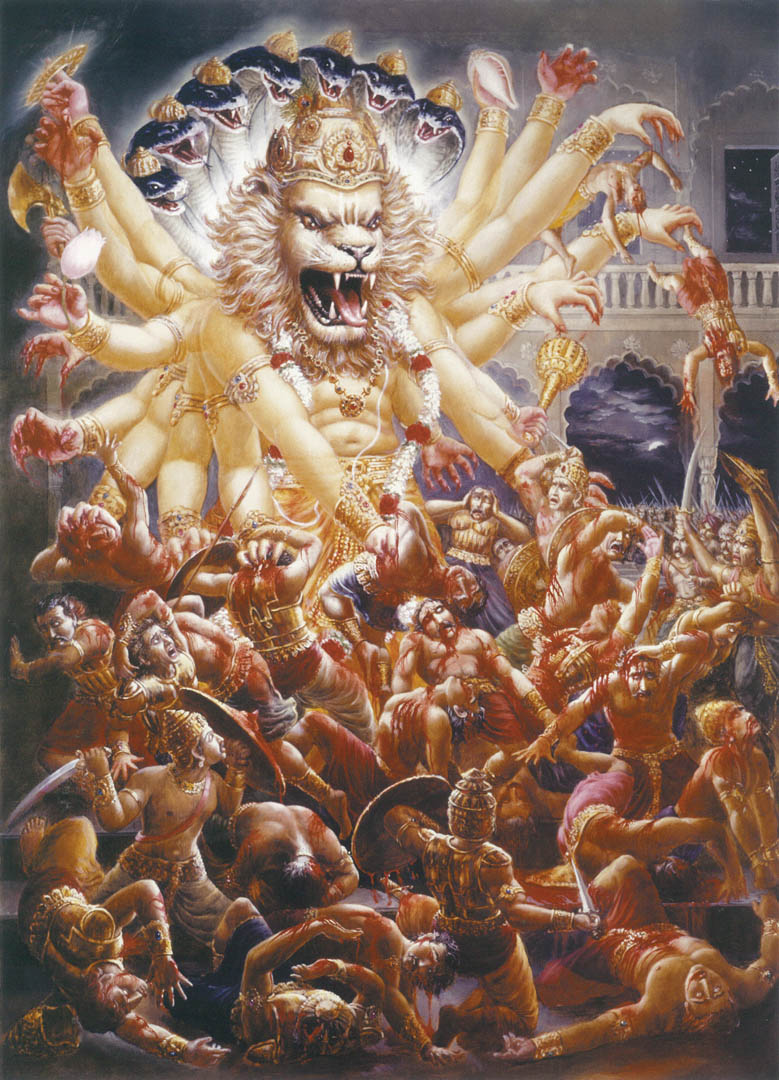 coming from. Then, from the pillar burst forth the most amazing and wonderful creature. The Supreme Lord appeared there as Lord Nṛsiṁhadeva. He was neither man nor lion; rather, He was a mixture of the two. He had the head of a lion – huge, ferocious and dangerous; and the body of a man – very beautiful and strong.
coming from. Then, from the pillar burst forth the most amazing and wonderful creature. The Supreme Lord appeared there as Lord Nṛsiṁhadeva. He was neither man nor lion; rather, He was a mixture of the two. He had the head of a lion – huge, ferocious and dangerous; and the body of a man – very beautiful and strong.
Lord Nṛsiṁhadeva became extremely furious and menacing. Flames were coming out of His mane, which was flying in the air and touching the sky. It seemed as if the whole world was on fire. Hiraṇyakaśipu wondered, “Is this a man or a lion?” And then he attacked that extraordinary creature, beating Him with his club. They fought like two giant wrestlers, locking arms in combat and rolling from corner to corner. Nṛsiṁhadeva tightly grabbed hold of Hiraṇyakaśipu. As he was struggling to get free, the Lord loosened His grip and let that demon slip out of His clutches. Watching the fierce combat and seeing how Hiraṇyakaśipu escaped from Nṛsiṁhadeva’s hands, all the demigods became nervous. They feared that if Hiraṇyakaśipu would not be killed, he would continue to harass them, as well as all the other living entities in the universe. In great anxiety they cried out, “Alas, alas, now Hiraṇyakaśipu will kill the Lord, and then he will kill all of us!”
But there was no need to worry. Nṛsiṁhadeva was playing with Hiraṇyakaśipu just as the eagle Garuḍa plays 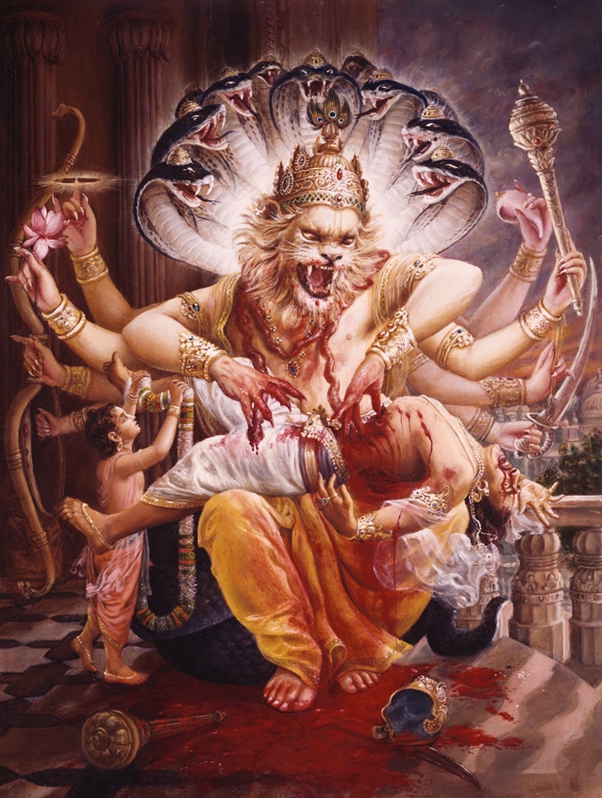 with snakes. After resting briefly, Hiraṇyakaśipu took his sword and shield and, with great force, attacked the Lord again. Lord Nṛsiṁhadeva easily captured Hiraṇyakaśipu and took him on His lap. More ferocious than a lion, Nṛsiṁhadeva roared loudly as He ripped open Hiraṇyakaśipu’s stomach with His large nails. He pulled out all of the demon’s intestines and draped them around His neck like a garland while blood spattered here and there. That demon was killed in a moment. The Lord continued roaring in anger and everyone was scared.
with snakes. After resting briefly, Hiraṇyakaśipu took his sword and shield and, with great force, attacked the Lord again. Lord Nṛsiṁhadeva easily captured Hiraṇyakaśipu and took him on His lap. More ferocious than a lion, Nṛsiṁhadeva roared loudly as He ripped open Hiraṇyakaśipu’s stomach with His large nails. He pulled out all of the demon’s intestines and draped them around His neck like a garland while blood spattered here and there. That demon was killed in a moment. The Lord continued roaring in anger and everyone was scared.
To respect the words of the creator Brahmā, the Lord came in this form. Brahmā had given Hiraṇyakaśipu the benediction that any man or any animal would not kill him. He would not be killed in the daytime or the nighttime, nor in any of the twelve months of the year. He would not be killed outside or inside, not on the earth and not in the sky, not by an arrow, club, sword or any other weapon, and not by anything living or dead. Thus, Lord Nṛsiṁhadeva – who was half-man, half-lion – killed the demon in the evening as the sun was setting – it was neither daytime nor nighttime; during a leap year – it was not a regular year; in the doorway – not inside or outside; on His lap – not on the earth or in the sky; and using only His very, very huge and beautiful nails – not any weapon nor anything living or dead.
Nṛsiṁhadeva was so angry at that time that no one could go near Him. Many, many demigods, including Lord Śiva and Lord Brahmā, were there, standing in front of the Lord but at a distance. Lakṣmī, the Goddess of Fortune, had come and wanted to pacify Nṛsiṁhadeva with Brahmā and Śiva, but none of them dared to come close. They turned to Prahlāda Mahārāja, saying, “Dear boy, you should go and pacify Nṛsiṁhadeva.” Smiling, Prahlāda Mahārāja gladly ran to Lord Nṛsiṁhadeva and jumped on His lap. The Lord’s anger vanished at once and He became calm and quiet. With melted heart Nṛsiṁhadeva caressed Prahlāda Mahārāja, and with tears in His eyes, He said, “O Prahlāda, My dear boy! Excuse Me for taking so long to come. I wanted to come sooner, but I could not come until now. Lord Brahmā promised your father that he would not be killed in any regular year 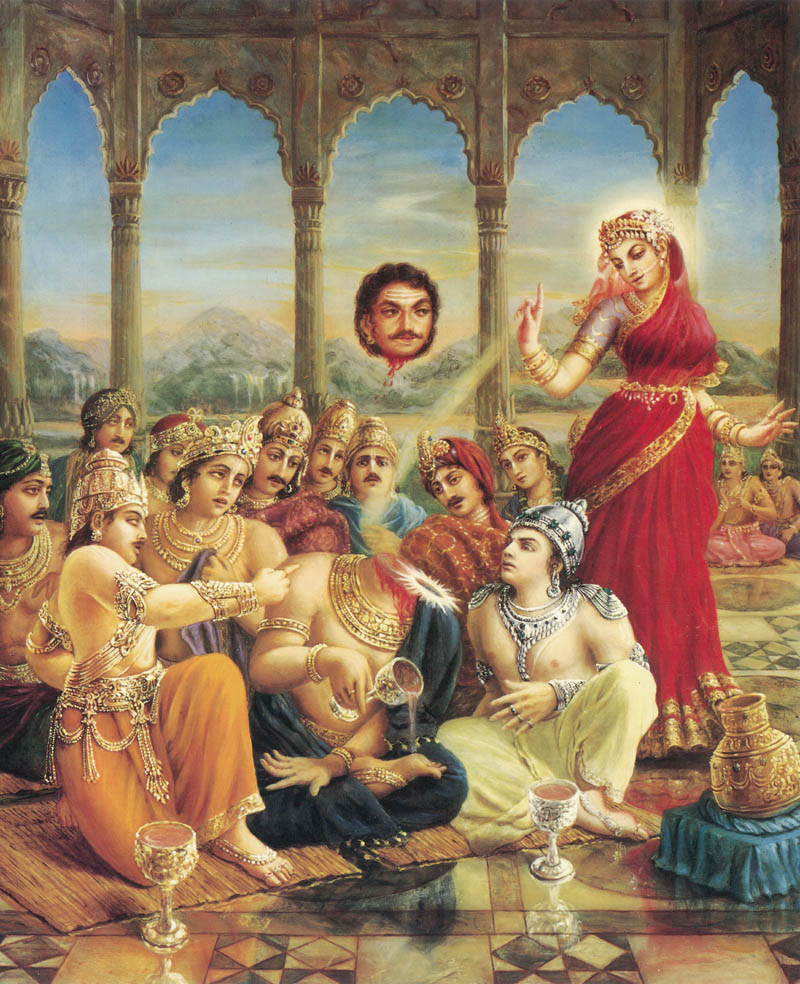 or any month, so I had to wait for the proper moment. And I wanted the world to bear witness to the exalted nature and power of your devotion. Your father was giving you so many difficulties and problems. Because you had to tolerate so much, I want to reward you with a benediction.”
or any month, so I had to wait for the proper moment. And I wanted the world to bear witness to the exalted nature and power of your devotion. Your father was giving you so many difficulties and problems. Because you had to tolerate so much, I want to reward you with a benediction.”
To test Prahlāda, the Lord offered to award him the liberation that was given to the demon Śiśupāla – merging into the Lord’s transcendental body. So many impersonalist sages in the line of Śaṅkarācārya strived for this type of salvation but could not achieve it even after thousands and thousands of births. Nṛsiṁhadeva was ready to give this easily to Prahlāda, but he rejected it. The Lord requested him again and again, “You should take a boon from Me.” But Prahlāda refused.
The boy smiled and replied, “What to speak of this impersonal liberation, I don’t even want to be in Vaikuntha, Your eternal abode in the Spiritual Sky. I will not ask You for anything. I am not a businessman who takes something in exchange for Your service. I have not served You in order to get a benediction from You. I am not that type of person. I have served You only to satisfy You. I only ask that You be pleased with me.”
“Prahlāda, you must take a boon so that My appearance here does not go in vain. You must ask for something only to please Me; otherwise, I will not be happy. Ask for any boon.”
“If You want to give me a boon, I request You to remove any worldly desires that I may have.”
Nṛsiṁhadeva answered, “You have no worldly desires, none. Ask for something else.”
“If you want to give something, then there is one thing I would like. My father has performed so many heinous atrocities and committed untold offences against saintly persons. Nonetheless, I request that he be liberated.”
The Lord said, “He has already been liberated. For a high-level, pure devotee who is serving Kṛṣṇa, chanting His names and remembering Him, twenty-one previous generations in his dynasty are automatically liberated. For a second-class devotee, fourteen generations are easily liberated. And for the neophyte devotee who takes shelter of the lotus feet of a pure-hearted guru and who is chanting God’s names and remembering His activities, seven generations are freed. So, surely your father has been given salvation. Ask for something else.”
Prahlāda replied, “I know that I am very near and very dear to You. If You are pleased with how I have served You, then in exchange I request You to liberate everyone in the material universe. You are so affectionate to Your devotees. All living beings are Your parts and parcels and, therefore, Your eternal servants. Everyone in this world is suffering. I will take all their sins and reactions – everything. I want to suffer for them. I will stay here for as many births as necessary and I am even willing to go to hell forever for them. Please be merciful and grant me this boon for the benefit of all.
“O my Lord, O infallible one. I am prepared to take thousands and thousands of births. I only request that 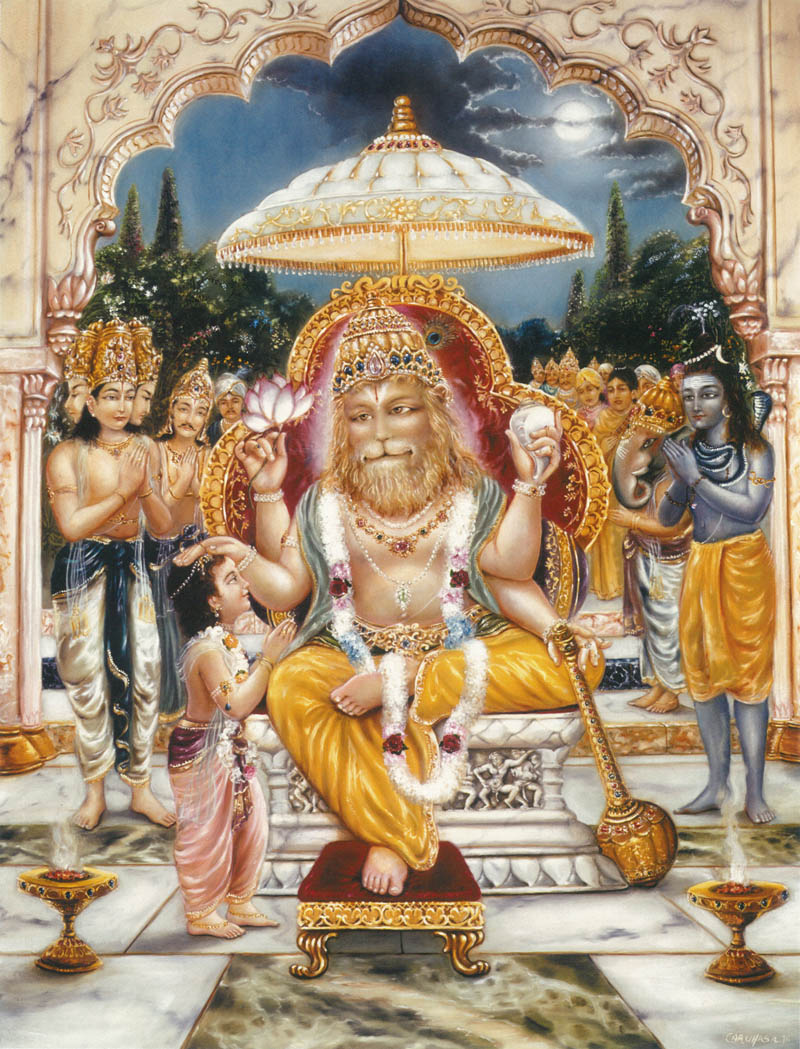 wherever You place me, I receive the association of great saints and always worship You.”
wherever You place me, I receive the association of great saints and always worship You.”
Nṛsiṁhadeva answered, “O Prahlāda, you have indeed purchased Me. Now I am yours. I cannot cheat you with material benedictions and I cannot possibly allow you to suffer. But I will agree to this – those who hear or tell others this pastime will be easily liberated. Not only will they be liberated, but they will receive pure devotion for Me. How will this happen? They must first take shelter of a bona fide guru – this means accepting initiation and agreeing to live under his guidance according to his instructions. In this way living entities will be gradually liberated.”
Thus, Prahlāda Mahārāja received a wonderful benediction to help all the living beings suffering in the material world. Steeped in pure devotion for the Supreme Lord, he had no care for his own welfare because he knew that the Lord was always looking after him. He was free from worldly desires, and he never accepted salvation, that is, merging into the form of the Lord. He knew that the Supreme Lord was everywhere and was all-powerful. As the possessor of all energies, the Lord can create whole universes in a second and just as easily destroy them. And again He can recreate them. He is supremely powerful, supremely charming, supremely sweet, supremely handsome and supremely wonderful. He is also very humble and always satisfied. When in danger, Prahlāda never worried because he had firm faith. He knew, “My Lord is supporting and maintaining me, and He will always protect me. He has the power to do this.” Why did he have that faith? Because Nṛsiṁhadeva manifests great opulences, and His devotees worship Him with knowledge of His unlimited powers.
So many difficulties came in Prahlāda’s life, but he tolerated all of them and never protested. He never even thought of cursing his father, and he never replied to him in harsh words. Rather, he was always polite and respectful. Like Prahlāda Mahārāja, we should try to practice bhakti-yoga, the science of pure devotional service to the Supreme Lord. Prahlāda was always praying to the Lord and meditating on Him because he understood that Kṛṣṇa is the Supreme Transcendental Being. Nṛsiṁhadeva, one of Kṛṣṇa’s manifestations, is also supremely transcendental, and that is why He is so powerful. Hiraṇyakaśipu tried to kill Him, but no one can kill the Supreme Lord.
In this way Prahlāda Mahārāja was always thinking about the opulence and majesty of the Supreme Lord Śrī Viṣṇu. He knew that his Lord is all-pervading. He is everywhere, He can appear anywhere at any moment, and He is all-powerful. Because Prahlāda had perfect realization of Śrī Kṛṣṇa’s powers, he knew that He would protect him. He was never worried in the slightest. He could see his Lord everywhere – in every atom and in everyone’s heart. Even when in danger, he felt happily situated. He simply prayed to Kṛṣṇa and had no fear whatsoever. He always saw that his Lord was with him and that He was coming and saving him. Because Prahlāda’s faith was so strong, Kṛṣṇa constantly protected him against any kind of threat. Death could not approach him at all.
If it is your time to die, death will surely come, and if you are not meant to die, then no one and nothing can kill you. Prahlāda’s faith made him very bold. You should also be very bold like him. I am telling this story for everyone’s benefit. If death is approaching and so many problems are coming, try to rise above all your troubles. Do not become disturbed, but rather try to be fixed in your chanting the names of God and remembering Him regardless of any obstacles. Do not hesitate in continuing your worship of Śrī Kṛṣṇa. These are the teachings of Prahlāda Mahārāja.
If you are aware of Kṛṣṇa’s opulences, that He is the supreme power and that He creates the whole material manifestation, then you will be peaceful. You will understand that Kṛṣṇa is the original cause of all causes. He has a transcendental form and endless transcendental qualities. Kṛṣṇa is like the transcendental sun, and the 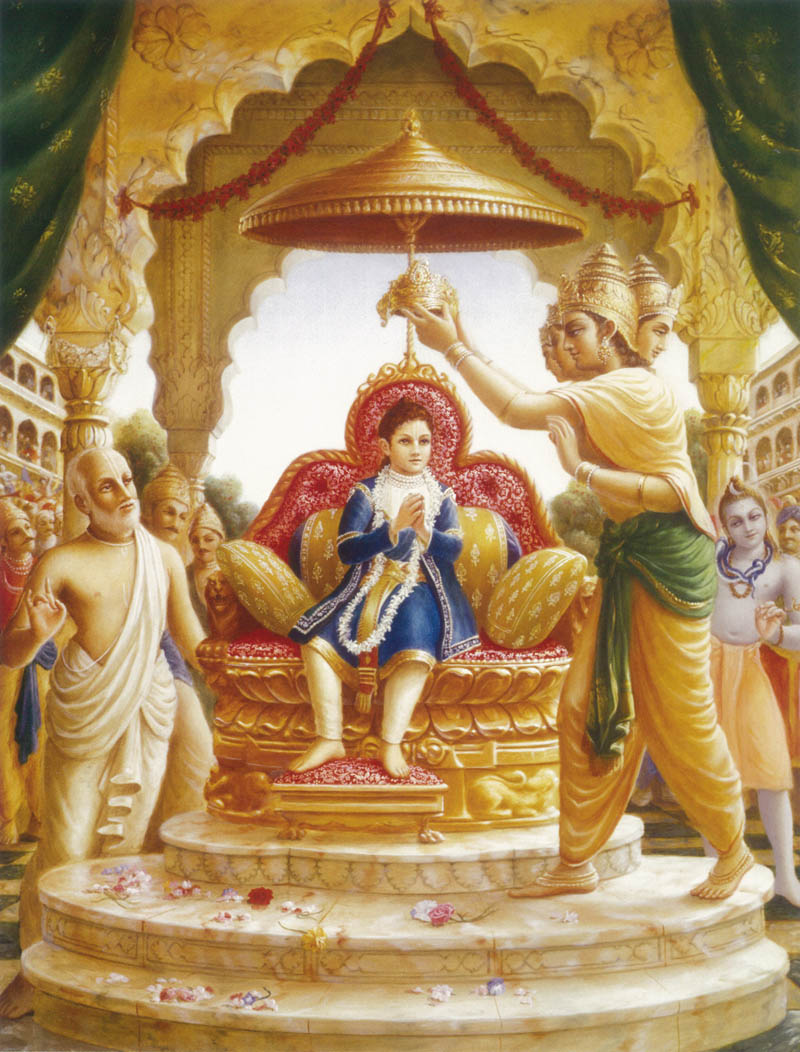 individual living beings, who are all His eternal servants, are like the particles in the sun’s rays. All souls are specks of Kṛṣṇa’s energies, minute atoms of His power. This means that we are made of the same divine essence that God is made of – eternity, bliss and knowledge. And the purpose of our existence is to share loving exchanges with the Supreme Person, who, whether we realize it or not, is always showering us with His love and mercy. Because Prahlāda Mahārāja had this vision of the Lord, his life and teachings are very helpful for all who want to develop their spiritual lives.
individual living beings, who are all His eternal servants, are like the particles in the sun’s rays. All souls are specks of Kṛṣṇa’s energies, minute atoms of His power. This means that we are made of the same divine essence that God is made of – eternity, bliss and knowledge. And the purpose of our existence is to share loving exchanges with the Supreme Person, who, whether we realize it or not, is always showering us with His love and mercy. Because Prahlāda Mahārāja had this vision of the Lord, his life and teachings are very helpful for all who want to develop their spiritual lives.
After Hiraṇyakaśipu’s demise, Prahlāda Mahārāja became the king, and he preached bhakti everywhere in his kingdom. He encouraged everyone to chant Kṛṣṇa’s names, to remember the Lord, to engage in the congregational singing of God’s holy names, and to hear discourses on the Supreme Lord. Thus his kingdom became like the spiritual world, the realm of perfection beyond all anxiety.
tava kara-kamala-vare nakham adbhuta-śṛṅgaṁ
dalita-hiraṇya-kaśipu-tanu-bhṛṅgam
keśava! dhṛta-narahari-rūpa! jaya jagadīśa! hare
(from Gita Govinda, by Śrī Jayadeva Gosvāmī)
[Upon the beautiful lotuses of Your hands, Your nails, with their amazing tips, have torn asunder the wasp-like body of Hiraṇyakaśipu. O Keśava, who assumed the form of a man-lion (Nṛsiṁha), all glories to You, O Lord of the Universe, O Hari]
O Keśava! O You who assume the form of a half-man, half-lion! O Jagadīśa! O controller of the universe! O You who remove Your devotees’ suffering! All glories to You because with one of the wonderful, petal-like nails of Your beautiful lotus hands You rip asunder the bumblebee-like body of Hiraṇyakaśipu. The astonishing thing about this is that ordinarily, it is the bumblebee that rips the petals of the lotus, but here, the petal rips apart the bumblebee.
Hare Kṛṣṇa Hare Kṛṣṇa Kṛṣṇa Kṛṣṇa Hare Hare
Hare Rāma Hare Rāma Rāma Rāma Hare Hare
Source: Purebhakti.com
Image(s) made possible by Pixabay.com, Krishnapath.org and/or Bhaktiart.net
Unless indicated differently, all verse translations and quotes are from the books by Śrīla Prabhupāda (Vedabase.com)